

European Commission unhappy with Fourth Railway package vote. Photo: jorgedasi/ shutterstock.com.
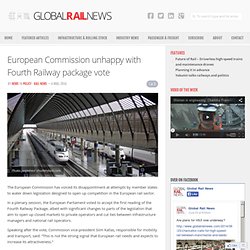
The European Commission has voiced its disappointment at attempts by member states to water down legislation designed to open up competition in the European rail sector. In a plenary session, the European Parliament voted to accept the first reading of the Fourth Railway Package, albeit with significant changes to parts of the legislation that aim to open up closed markets to private operators and cut ties between infrastructure managers and national rail operators. Speaking after the vote, Commission vice-president Siim Kallas, responsible for mobility and transport, said: “This is not the strong signal that European rail needs and expects to increase its attractiveness.” The vote did back the legislation’s ‘technical pillar’, enabling the creation of a single European safety certificate which is awarded by the European Railway Agency (ERA).
The new system is expected to reduce the approvals process from around two years to just three months.
Nordic & Baltic rail operators. CESE rail operators. CIS Rail operators. DeAtCh rail operators. Rail Europe reports outstanding results for 2012 - Road and Rail News. With a 16% increase in sales year on year and traveller numbers reaching 2.6 million, Rail Europe confirms that in 2012 its dynamism and reinforces its position as the number one distributor of European rail travel in the world.
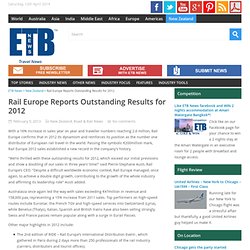
Passing the symbolic €200million mark, Rail Europe 2012 sales established a new record in the company’s history. "We’re thrilled with these outstanding results for 2012, which exceed our initial previsions and show a doubling of our sales in three years’ time! " said Pierre-Stephane Austi, Rail Europe’s CEO. "Despite a difficult worldwide economic context, Rail Europe managed, once again, to achieve a double digit growth, contributing to the growth of the whole industry and affirming its leadership role" Austi added. Australasia once again led the way with sales exceeding €47million in revenue and 158,000 pax, representing a 15% increase from 2011 sales.
SNCF mulls bidding au revoir to Rail Europe in the UK and Europe « Tnooz. SNCF, the French Railway, is plotting moves that affect the online distribution of train tickets for inter-city routes in Europe.
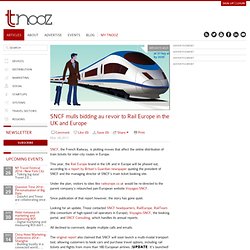
This year, the Rail Europe brand in the UK and in Europe will be phased out, according to a report by Britain’s Guardian newspaper quoting the president of SNCF and the managing director of SNCF’s main ticket booking site. Under the plan, visitors to sites like raileurope.co.uk would be re-directed to the parent company’s relaunched pan-European website Voyages-SNCF.
Since publication of that report however, the story has gone quiet. [Exclu] Revente de billets de train : zePass lance un nouveau service et un livre blanc. Lancée en 2002, zePass est une place de marché – tiers de confiance – de billetterie d’occasion (partenaires de Voyages-SNCF, les Enfoirés, l’Olympique de Marseille, les Vieilles Charrues… A l’occasion de LeWeb’11, zePass a dévoilé son nouveau service, Revente Express, qui permet de proposer un billet de train à la revente « en 3 secondes ».
![[Exclu] Revente de billets de train : zePass lance un nouveau service et un livre blanc](http://cdn.pearltrees.com/s/pic/th/revente-billets-frenchweb-40645833)
Il suffit de transférer au site l’e-mail de réservation d’un billet pour que soit publiée automatiquement une annonce lui correspondant. Un gain de temps et d’efficacité notable dans un secteur très concurrentiel. zePass livre également en exclusivité à FrenchWeb son premier livre blanc sur la revente de billets de train. European rail: How EU initiative Shift2Rail may affect travel companies. It’s not always obvious when an announcement from the European Union has real-world implications or is merely wishful thinking.
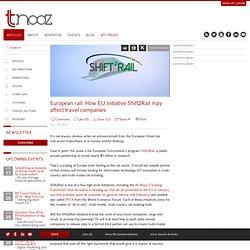
Case in point: this week’s the European Commission’s program Shift2Rail, a public-private partnership to invest nearly €1 billion in research. That’s a tripling of Europe-level funding to the rail sector. A small but notable portion of that money will include funding for information technology (IT) innovation in multi-country and multi-modal rail ticketing. Shift2Rail is one of a few high-level initiatives, including the All Ways Traveling Consortium (that Amadeus is heading up, that sill be presented to the EU in January, and that probably wont be available for general release until February) and another one called IPITA from the World Economic Forum. Calea Ferată din Moldova. History[edit] In 1844, Governor-General of Novorossiya and Bessarabia Count Mikhail Vorontsov has developed a project of a railway, connecting Odessa and Parcani village by the Dniester.
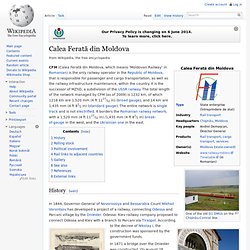
Odessa- Kiev railway company proposed to connect Odessa and Kiev with a branch to Parcani via Tiraspol. According to the decree of Nikolay I, the construction was sponsored by the government funds. In 1871 a bridge over the Dniester was constructed. On August 28, 1871, the railway linking Tiraspol with Chişinău was officially opened. TrainOSE. TrainOSE S.A.
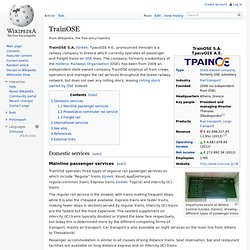
(Greek: ΤραινΟΣΕ Α.Ε., pronounced trenosé) is a railway company in Greece which currently operates all passenger and freight trains on OSE lines. The company, formerly a subsidiary of the Hellenic Railways Organisation (OSE), has been from 2008 an independent state-owned company. TrainOSE employs all train crews, operators and manages the rail services throughout the Greek railway network, but does not own any rolling stock, leasing rolling stock owned by OSE instead.
Domestic services[edit] Mainline passenger services[edit] Departures board at Athens Central (Larissa station), showing different types of passenger trains TrainOSE operates three types of regional rail passenger services on which include "Regular" trains (Greek: Κοινή αμαξοστοιχία, regular/common train), Express trains (Greek: Ταχεία) and Intercity (IC) trains.
The regular rail service is the slowest, with trains making frequent stops, while it is also the cheapest available. Main article: Proastiakos.